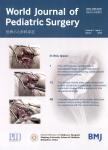Kidney structure and function in dilating vesicoureteral reflux patients with anorectal malformation
作者机构:Department of Pediatirc General and Urogenital SurgeryJuntendo University School of MedicineBunkyo-kuTokyoJapan
出 版 物:《World Journal of Pediatric Surgery》 (世界小儿外科杂志(英文))
年 卷 期:2020年第3卷第2期
页 面:1-5页
学科分类:1002[医学-临床医学] 100202[医学-儿科学] 10[医学]
主 题:patients Kidney malformation
摘 要:Background We assessed the impact of anorectal malformation(ARM)on the kidneys of children with dilating vesicoureteral reflux(D-VUR)≥grade III using a simple dimercaptosuccinic acid(DMSA)scintigraphy scan based renal dysfunction score(RDS).Methods The medical records of 121 patients with D-VUR treated between 2000 and 2014 were reviewed *** excluding patients with secondary D-VUR(n=18),presence of ARM was used to create two groups:ARM+(n=12 cases;15 ureters)and ARM-(n=91 cases;131 ureters).Types of ARM,grades of D-VUR,bladder and bowel dysfunction(BBD)and RDS were *** Patient demographics,mean follow-up,grades of D-VUR and history of urinary tract infections were not significantly *** was significantly higher in ARM+(41.7%versus 7.7%,p=0.0006).RDS was significantly higher in ARM+(p=0.036).Grades of D-VUR were significantly lower in ARM-with low RDS(p=0.008).During follow-up,changes in DMSA uptake over time were not observed in ARM+.Conclusions While renal cortical lesions were correlated with grade of D-VUR in ARM-and RDS was significantly higher in ARM+,BBD did not appear to contribute to progressive renal dysfunction as is commonly *** fact,no progression in renal cortical lesions was observed in ARM+based on RDS *** cortical lesions may possibly be a feature of ARM,a topic that warrants further study.



